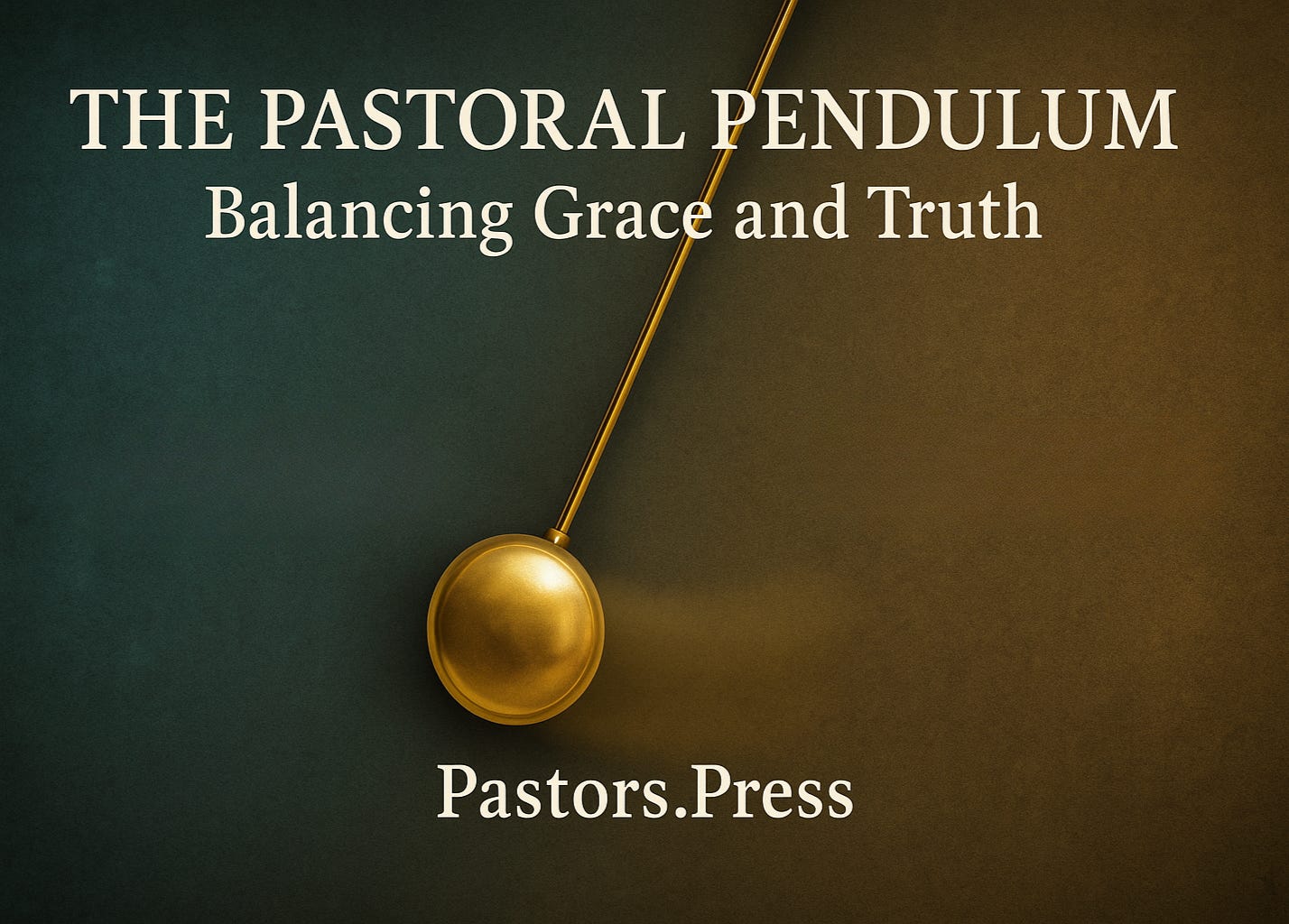The Pastoral Pendulum
Balancing Grace and Truth
Key Verse:
“For the law was given through Moses; grace and truth came through Jesus Christ.”
—John 1:17
Balancing Grace and Truth
In every generation, the Church wrestles with the tension between grace and truth. Some congregations lean so heavily toward grace that they risk softening the demands of discipleship. Others swing toward truth so rigidly that compassion seems to vanish. Pastors often feel this pendulum pulling their hearts in both directions, striving to reflect the character of Christ—who was “full of grace and truth.”
Like a pendulum in motion, ministry naturally swings between these two divine qualities. The challenge lies not in choosing one over the other, but in holding them both firmly, faithfully, and fearlessly.
Why This Balance Matters
1. Because Grace Without Truth Leads to License
When grace is preached without truth, the gospel becomes sentimental rather than salvific. It soothes the conscience but seldom changes the heart. In an age that prizes tolerance above transformation, the temptation is strong to avoid hard topics—sin, repentance, judgment. But grace divorced from truth is hollow compassion. True grace tells us, “Come as you are,” while truth adds, “But don’t stay that way.”
A pastor who leans too far toward grace may comfort people on the road to destruction. The Apostle Paul reminds us that God’s kindness is meant to lead us to repentance, not to justify rebellion (Romans 2:4). Real grace confronts sin because it loves the sinner too much to leave them there.
2. Because Truth Without Grace Leads to Legalism
On the other hand, truth without grace crushes the spirit. It builds walls instead of bridges and produces compliance without conversion. Many pulpits thunder with doctrine but lack tenderness. The result? People know what they’ve done wrong but feel they can never be made right.
Jesus demonstrated that truth and grace are not rivals—they are partners. When He encountered the woman caught in adultery, He neither excused her sin nor condemned her soul. He said, “Neither do I condemn you. Go, and sin no more.” (John 8:11). That single sentence is the perfect fusion of grace and truth—the heart of Christ in harmony.
3. Because the Pastor’s Example Shapes the Flock
Shepherds set the tone. If a pastor models grace without standards, the congregation will drift toward compromise. If he models truth without tenderness, they will grow cold and critical. But when a pastor lives out both—speaking the truth in love, extending mercy while upholding holiness—the church reflects the balanced beauty of Jesus Himself.
Ministry demands discernment. There will be times to rebuke and times to restore, moments to correct and moments to comfort. The mature pastor learns that both are acts of love.
The Challenge of the Middle Ground
The middle ground is rarely comfortable. Pastors who emphasize truth are accused of being judgmental; those who emphasize grace are called soft. But the call to ministry has never been about comfort—it’s about faithfulness. The pendulum may swing, but the pivot must remain Christ.
This balance doesn’t come naturally. It comes through prayer, humility, and a deep love for both God’s Word and God’s people. It’s the work of a lifetime to preach grace that saves and truth that sanctifies—never diluting either for the sake of popularity or peace.
Practical Ways to Maintain Balance
Preach Both: Every sermon should offer both conviction and comfort. Show people their sin, but always point them to the Savior.
Practice Patience: Growth takes time. Truth plants the seed; grace waters it. Trust God to bring the increase.
Pray for Wisdom: Only the Spirit of God can help you know when to confront and when to console.
Personalize Your Ministry: Every person you counsel is a unique soul. Some need a firm word; others need a gentle touch.
Protect Your Own Heart: Immerse yourself daily in Scripture and prayer. The more you walk with Jesus, the more you’ll naturally reflect both His compassion and His conviction.
The Sacred Privilege
To pastor is to walk daily in the footsteps of the One who embodied both justice and mercy. The cross itself stands as the ultimate expression of this balance—truth demanded payment for sin, but grace provided it.
Every time you stand behind a pulpit, counsel a struggling soul, or pray with the brokenhearted, you are holding that divine tension in your hands. To extend grace while proclaiming truth is not weakness; it is Christlikeness.
Let the pendulum swing, but let it always return to center—in Him who is full of grace and truth.
Prayer Thought
Lord, help me to lead like Jesus—strong in truth, yet soft in spirit. Keep me from the extremes of compromise or condemnation. Fill my words with grace, and anchor my heart in truth. May my ministry reflect both Your holiness and Your mercy, for the good of Your Church and the glory of Your Name. Amen.
Pastoring Tip of the Week
When you prepare your sermons, ask yourself: “Does this message both confront and comfort?” A balanced sermon feeds the soul and challenges the will. Remember, you are not called to please men, but to represent Christ—gracious and truthful in equal measure.
Looking for fresh, biblical, and well-crafted preaching and teaching resources?
Explore our sermon and Bible study subscriptions:
SermonSubscription.com – Weekly ready-to-preach sermons.
LectionaryLink.com – Lectionary-based sermon helps.
ExpositoryPulpit.com – In-depth expository outlines.
MidWeekBibleStudies.com – Reproducible Bible study lessons.
SmallGroupBibleStudies.com – Instant small group studies for your church.
Equip yourself. Strengthen your people. Preach the Word—grace and truth together.



